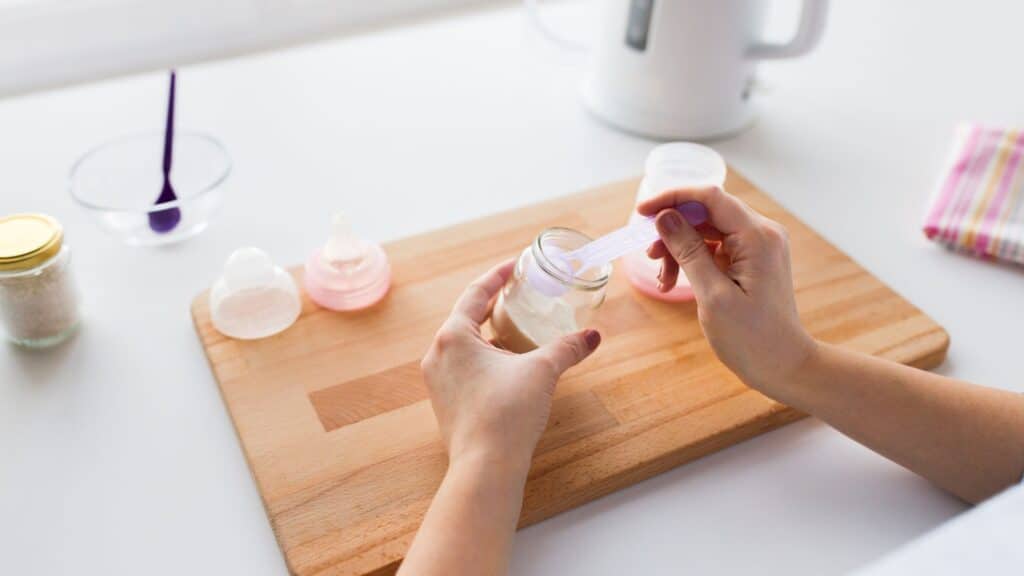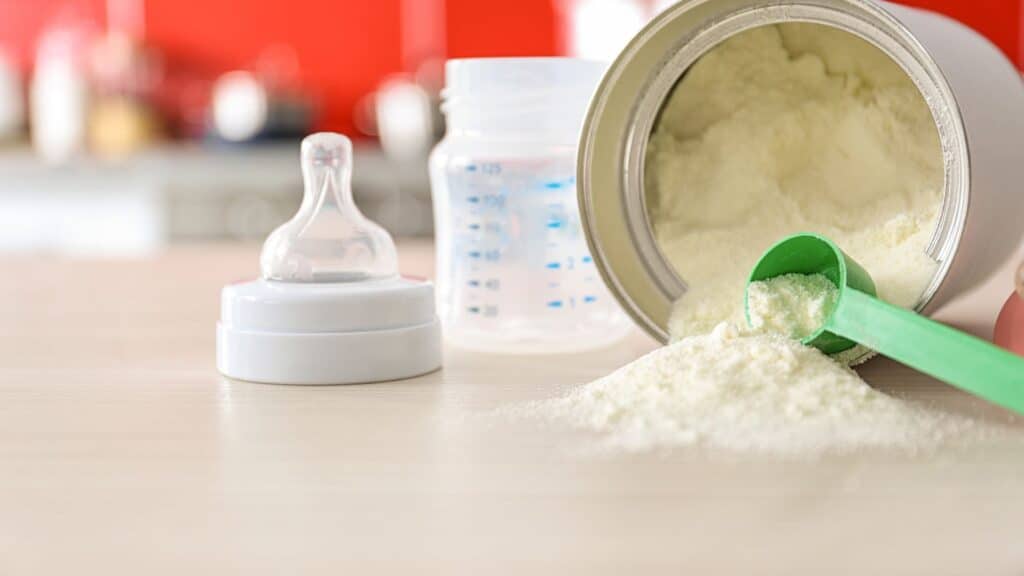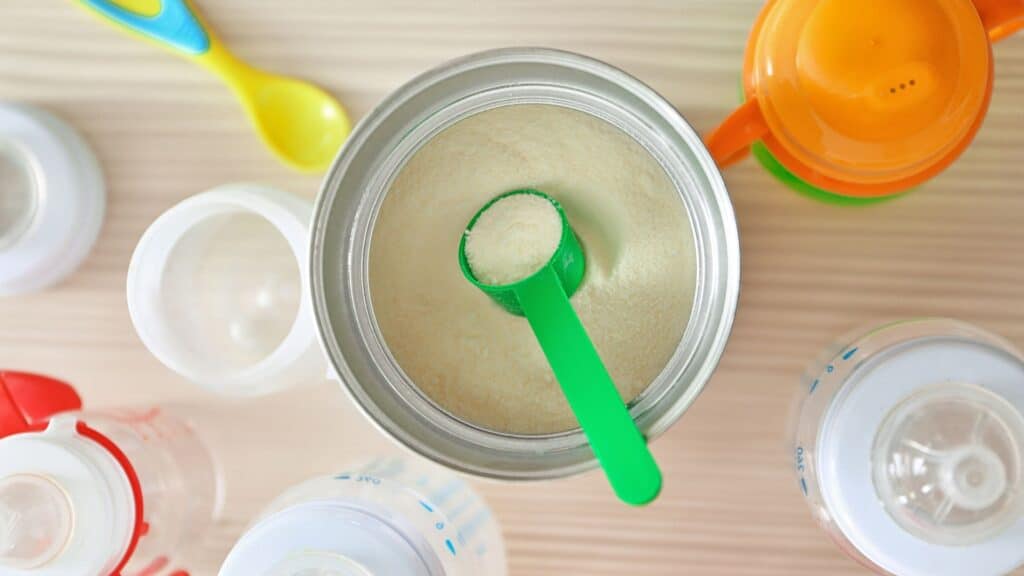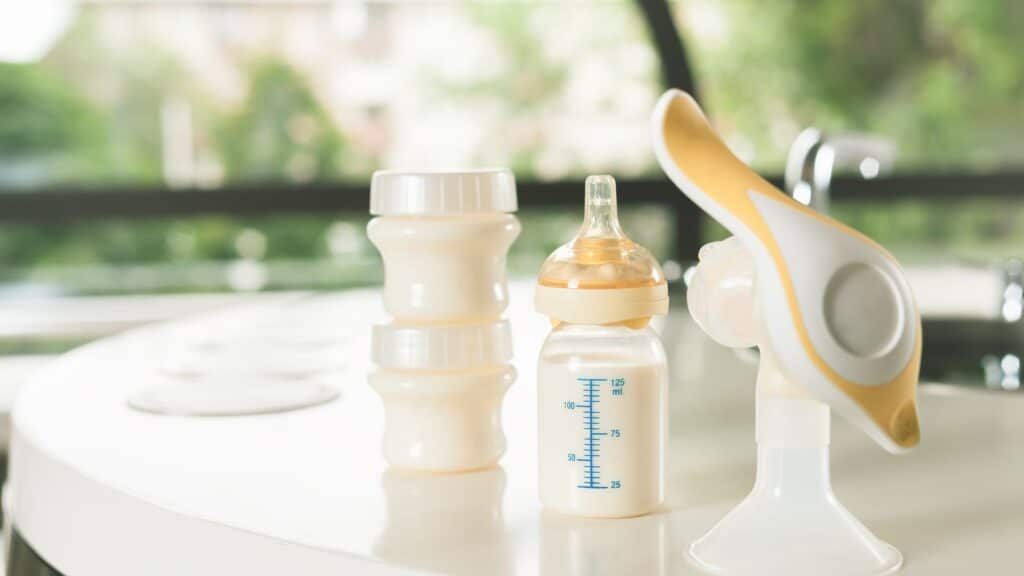Understanding baby formula cost is key for new parents navigating formula options. With numerous choices, it’s essential to find the right one for your baby. We have done the research to help you!
We know that choosing the best infant formula can be a daunting task. There are different types of baby formulas available, and each formula brand claims to be the best. Additionally, the cost of formula can add up quickly, and it can feel like you’re spending a million dollars just to feed your baby.
To help you make an informed decision, we’ve looked at the average formula costs, ways to save on baby formulas, and the benefits of different types of formula feed. With this information, you can choose the right baby formula that fits your budget, and you can buy formula with confidence knowing that you’re providing your baby with the best possible nutrition.

Average Cost of Baby Formula
Navigating the complex world of parenthood involves making countless decisions, and selecting the ideal baby formula is one of the crucial ones. From endless brand options to varying nutritional compositions, determining the most suitable baby formula presents its own challenge. Even more so, understanding the cost implications of your choice is a key aspect to consider. The good news is, we have carried out thorough research to help simplify the process for you. This research incorporates valuable data on the average cost of various baby formulas, enabling you to make an informed decision that fits comfortably within your family’s budget while meeting your precious infant’s dietary needs.
Types of Baby Formula
There are three main types of baby formula: concentrated, powdered, and ready-to-feed.
Powdered Formula
Powdered formula is a popular and cost-effective option for many moms, but it can come at the cost of convenience. While it’s cheaper than concentrated or ready-to-feed formulas, you’ll have to spend time measuring and mixing it with water.
However, the added benefit is that powdered formula often has lower levels of added sugars than some of the more expensive major brand formulas, which can be a big plus for those concerned about their baby’s diet. Ultimately, the decision to choose powdered formula over other types will depend on factors like price, milk supply, and personal preferences.
Concentrated Formula
While breast milk is the best option for your baby’s nutrition, sometimes it’s not possible or practical for all parents. That’s where the formula comes in. However, choosing the right type of formula can be a challenge. Concentrated formula is a great option if your baby has trouble digesting dairy or soy proteins, but keep in mind that it can cost more per ounce than powdered or ready-to-feed formulas.
It’s important to remember that formula-fed babies can still gain weight and thrive, just like breastfed babies. So if you’re a parent who needs to supplement or replace breast milk with formula, don’t worry. You’re doing what’s best for your baby’s health.
As an alternative, some European formulas have gained popularity among American parents for their unique composition and regulations. However, they can be expensive and hard to find in the US.

Ready-To-Feed Formula
The ready-to-feed formula is another way to reduce waste. Some brands of ready-to-feed formulas come premeasured into individual bottles and are ready to feed immediately after opening the container (others require mixing with water before serving).
Ready-to-feed formulas cost more per ounce than other types, but they save time and money over time because they eliminate the need to measure out portions separately before feeding them to your child.
The average cost of baby formula varies depending on the type you buy. If you buy powdered or concentrated formula, the cost is usually around $10 to $20 per 1-pound container. The ready-to-feed formula costs $30 to $40 per 8-ounce canister.
Comparison of Prices Across Popular Brands and Stores
When buying baby formula, there are many brands and retailers. Here’s a breakdown of the average prices for a few popular brands and types of formulas:
- Similac Advance (powdered formula): $24.99 for a 23.2-ounce container at Target
- Enfamil NeuroPro (powdered formula): $27.98 for a 20.7-ounce container at Walmart
- Gerber Good Start Gentle (powdered formula): $26.99 for a 23.2-ounce container at Walgreens
It’s important to note that prices vary from retailer to retailer, so it’s a good idea to shop around before purchasing.
In addition to traditional brick-and-mortar stores, many online retailers sell baby formula. Here are a few popular options and their average prices:
- Amazon: Prices vary depending on the brand and type of formula, but many options are available for around $20 to $30 per container.
- Walmart.com: Similar to in-store prices, powdered formulas are typically available for around $25 to $30 per container.
- Target.com: Prices are similar to in-store options, with powdered formulas ranging from around $24 to $28 per container.
Remember that online retailers may offer discounts, coupons, or subscription services that can help you save money on baby formula. It’s also a good idea to check for manufacturers’ coupons, which can often be found on the brand’s or online coupon websites.
By comparing prices at different stores and taking advantage of deals and discounts, you can reduce the overall cost of baby formula without sacrificing quality or safety.

How Can the Cost of Baby Formula Vary on the Baby’s Age and Feeding Needs?
The cost of baby formula can vary depending on a number of factors, including the baby’s age and feeding needs. Here are a few ways that these variables can impact the overall cost of the formula:
Type of formula:
The baby formula’s cost depends on the formula type you choose. For instance, some formulas are made from cow’s milk, while others are made from soy or other plant-based ingredients. You’ll also find different types of formulas based on their use. Some are designed to be used as a supplement when breastfeeding but not as a complete replacement for nursing mothers; others are intended as a substitute for breast milk entirely in babies who aren’t able to nurse yet.
Feeding frequency:
The amount of formula you’ll need to buy will also depend on how frequently your child eats. For example, if they eat every two hours or less, you’ll only need enough formula for a day or two. On the other hand, if they have trouble sleeping through the night or are very active during the day, you’ll need to ensure you have enough formula on hand at all times.
Amount of formula needed:
A newborn may need 6 to 8 ounces of formula every 3 hours. The amount of formula a baby needs will increase as they grow older. A 6-month-old can drink up to 24 ounces every 4 hours, while a 9-month-old may require 30 to 60 ounces daily.
Length of time on a formula:
How long a baby stays on formula can vary depending on the baby’s age and feeding needs. For example, if a baby is older and growing quickly, you may need to buy a more expensive brand of formula to ensure that they are getting enough nutrients.
Hidden Costs of Baby Formula
One of the hidden costs of formula feeding is the additional expenses related to it. If you’re breastfeeding, you won’t need to buy bottles or nipples since those are reusable, but if you’re formula feeding, you’ll have to buy them. In addition, you’ll need to purchase cleaning supplies so that your bottles and nipples are always clean.
What’s more, you’ll also have to consider the cost of transportation if you’re buying your baby’s formula in bulk. And if your baby is sensitive to dairy or soy, you’ll need to spend money for lactose-free and casein-free alternatives, which can be hard to find!
The good news is that there are many ways to reduce these hidden costs. For example, try using coupons or shopping at discount stores like Costco or Sam’s Club. You can also look into buying in bulk online through sites like Amazon Prime Pantry or Subscribe & Save!
If you’re breastfeeding and want to pump, consider renting a hospital-grade pump rather than buying one outright to save money. Also, check with your insurance provider to see if they offer coverage for a breast pump. With a little research and smart shopping, you can provide your baby with the nutrition they need without breaking the bank!

Tips for Reducing These Costs Without Sacrificing Quality or Safety
There are ways to reduce these costs without sacrificing quality or safety. Here are some tips for cutting back on the hidden costs of baby formula:
- Stock up when it’s on sale. Most major retailers have sales cycles every few months where they offer discounts on select items. You can use these sales as opportunities to purchase multiple cans or bottles simultaneously, saving you money over time.
- Buy generic brands instead of name-brand ones. Generic brands are just as good as name brands regarding nutrition but are much cheaper! If you’re concerned about quality, try looking for products made by companies like Similac and Enfamil. Their products are known for being high quality and affordable, and they usually have coupons on their websites too!
- Look into buying used bottles and cans from other families who no longer need them (or check out Craigslist). Some parents sell their old bottles/cans online.
Cost Comparison: Formula Feeding vs. Breastfeeding
You’ve probably heard that breastfeeding is the best way to feed your baby, but it can also be a great way to save money. Breastfeeding is free and has many health benefits for you and your baby.
Breastfeeding offers a variety of benefits for babies, including protecting them against infection and allergies and lower rates of diabetes. Mothers who breastfeed also have a reduced risk of ovarian and breast cancer.
In addition to the health benefits, breastfeeding can save families thousands of dollars annually on formula. According to The Centers for Disease Control and Prevention (CDC), breastfeeding costs an average of $500 per year compared with $1,000 annually if babies are formula-fed at six months old. That adds up over time!
Strategies for Saving Money on Baby Formula
Here are some strategies for saving money on baby formula without compromising on quality:
Buy in bulk. You can buy cases of formula from many grocery stores and discount stores, or you can find them online.
Find coupons. You can find coupons for baby formula at your local grocery store or drugstore or buy them online.
Buy generic brands. These are often just as good as name brands but cost less.
Tips for Finding Coupons, Discounts, and Free Samples
Here are a few tips for finding coupons and discounts:
Look online. Many stores offer coupon codes or discounts on their websites, so check them out before you buy.
Sign up for store loyalty programs. Many stores offer rewards programs that can save you money when you shop. For example, Amazon Mom offers exclusive diapers and other baby supplies discounts when you sign up for its program.
Check out manufacturer websites for coupons or promotions. Some companies have special offers that only their website members get access to. This is especially true with formula companies; you might be able to find samples or discount codes that way!

Takeaway
In conclusion, providing your baby with a healthy diet is crucial for their growth and development. While formula feeding can be more expensive than breastfeeding, it can still be a cost-effective and safe option for many families.
Different formulas are available, each with its pros and cons, and the cost can vary depending on the type, brand, and retailer.
However, by shopping around, taking advantage of discounts and deals, and considering your baby’s age and feeding needs, you can reduce the overall cost without sacrificing quality or safety.
Ultimately it is important to choose a formula that works best for your baby, so they can thrive!
If you have any questions, feel free to leave a comment below and I’ll be happy to answer.



